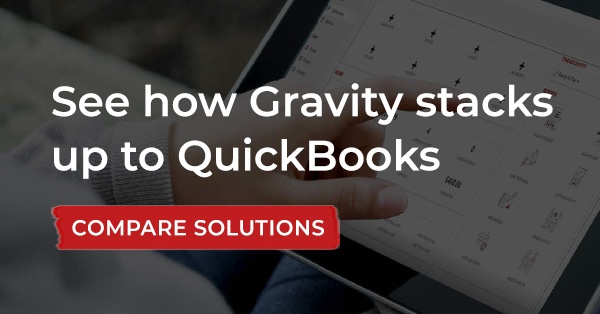5 signs you've outgrown QuickBooks (and what to do next)

QuickBooks is a household name in small business accounting—and for good reason. It’s simple, accessible, and gets the job done in the early stages. But as your business grows, you may find yourself fighting the very tools that once made your life easier.
If you’re managing more entities, adding complexity, or scaling faster than expected, it’s worth asking: have we outgrown QuickBooks?
Businesses in industries like healthcare, hospitality, and nonprofit management often hit roadblocks when their financial operations grow more sophisticated. They need deeper insights, entity-level visibility, and real-time reporting. QuickBooks, while dependable in the early stages, wasn’t designed for companies managing multiple entities, remote teams, or diversified financial structures. The longer companies stick with a solution not built for scale, the more they risk inefficiencies, data silos, and costly workarounds.
Let's explore 5 unmistakable signs - and what you can do to fix them.
1. You're drowning in spreadsheets
If exporting to Excel has become your finance team's default reporting strategy, that’s a red flag.
QuickBooks offers basic built-in reports, but the moment you need multi-dimensional views—like performance by department, location, or entity—you’re building workarounds.
Why it's a problem:
- Disconnected, static reports that lack real-time visibility
- Time wasted on updating formulas, combining sheets, or formatting PDFs
- Inability to drill into transaction-level detail without leaving the spreadsheet
Testimonial
“We’re now able to get our (previous) months closed by the fourth day of each month, with all reports printed and everything ready to go. It’s just a tremendous savings in terms of screen time and effort. I can get those done way ahead of time, get them planned ... then just jump from one to another and get them closed. It’s almost automatic.”
Robert Everman, Chief Operating Officer, Onefire Holding Co.
Gravity Software replaces spreadsheets with real-time dashboards and automated reporting built on Power BI—no exporting required.
These inefficiencies grow exponentially as you add more teams, departments, or funding sources. For example, nonprofits may need to report by program or funding source, while franchise operations want to view financials by location. Each of these needs requires filtering, slicing, and data segmentation. Spreadsheets can only take you so far—and they don’t offer a real-time snapshot. This delay in insights hinders decision-making and makes it harder to respond quickly to performance trends.
2. Managing multiple entities is a constant headache
QuickBooks is a single-entity system. If you manage multiple companies or locations, you’re stuck managing separate files or subscriptions for each—and manually combining results.
What that looks like:
- Logging in and out of different company files
- No shared vendors, customers, or chart of accounts
- Manual intercompany eliminations
Testimonial
“Gravity streamlined our workflow process and consolidated all of our companies into one user-friendly database, and because of this, we did not need to hire another accountant. Gravity has completely simplified our business processes, and other organizations that manage multiple companies surely could benefit from their multi-entity features, reporting capabilities, and customizable dashboards.”
Rette Rankin, Controller, InDevCo
With Gravity, you get a unified system for all your companies. One login, one chart of accounts, consolidated reports, and built-in intercompany processing.
This issue becomes especially pronounced for businesses in real estate, private equity, and healthcare networks—where managing dozens or even hundreds of entities is the norm. Without a unified platform, finance teams resort to tedious logins, duplicate data entry, and endless reconciliations. The result? Hours lost, inconsistent data, and increased risk of compliance issues. A centralized system helps eliminate friction, giving stakeholders confidence in the numbers and allowing your team to focus on strategy—not stitching reports together.
3. Month-end close takes too long
If your month-end process includes copying and pasting from QuickBooks into Excel, applying formulas, and emailing PDFs to stakeholders—it’s time for a change.
QuickBooks limitations:
- No native consolidation features
- No audit trail for manual adjustments
- High risk of formula errors or outdated data
Testimonial
“Month-end and year-end audits are a breeze now, thanks to consolidated financial reports with just one database to manage. We no longer have to explain to our auditor how to manage our multiple programs.”
Shawna Bailley, Director of Accounting, 360 Destination Group
Gravity Software’s built-in consolidation engine eliminates the guesswork and gets you to close faster—with full transparency.
Finance leaders often spend days consolidating reports for board meetings, audits, or lenders. That time can be cut down to minutes with automated consolidation tools. You gain the ability to handle eliminations, produce entity-level roll-ups, and present accurate snapshots—all while maintaining an audit trail. In industries like renewable energy or nonprofit grant management, this speed and accuracy is critical for maintaining stakeholder trust and funding continuity.
4. Your Chart of Accounts is out of control
Trying to track departments, locations, or funds in QuickBooks often means duplicating accounts for every variation—resulting in hundreds or thousands of accounts.
What you're likely dealing with:
- COA bloat
- Reporting complexity
- Misalignment across entities
Testimonial
“Gravity’s Dimensions feature has been a powerful tool for tracking meaningful data. It exceeded our expectations.”
Rosanne Nobile, Controller, Megastar Advisors
With Gravity, you tag each transaction with dimensions (e.g., location, department, fund), keeping your COA clean while expanding your reporting power.
A bloated chart of accounts doesn’t just make reporting painful—it often introduces errors when accounts are misused or duplicated. Without a standard structure, comparisons across entities or time periods become murky. By implementing dimensional accounting, you empower your team to ask better questions and deliver clearer insights. Want to know profitability by region, by project, or by department? Dimensions allow that without blowing up your general ledger structure.
5. You're growing . . . but your system isn't
Maybe you’ve added more users, teams, or compliance needs. Maybe you're integrating with other apps. But QuickBooks is still your bottleneck.
QuickBooks can't keep up when you need:
- Granular user permissions
- Automated workflows
- Multi-source integration
Testimonial
“I can do just one journal entry for 18 entities at once. Before Gravity Software, that would have taken a whole day.”
Bruno Pugliessa, Family Office Controller
Gravity Software, built on Microsoft’s Power Platform, is designed to scale with your team, your entities, and your complexity.
As companies adopt more complex workflows—like AP automation, budget vs. actuals, or integrated payroll—QuickBooks begins to show its limits. For growing teams, the lack of customizable user roles and workflow approvals becomes a security risk. And if your accounting platform can’t easily integrate with other cloud tools, you end up with a fragmented tech stack. Gravity Software solves this with deep Microsoft 365 integration and flexible automation—so your systems talk to each other, and your team moves faster.
Don't let QuickBooks hold you back
If one—or several—of these signs hit home, it’s time to consider a more powerful, scalable solution.
Gravity Software helps growing organizations move beyond spreadsheets and workarounds. With true multi-entity capabilities, dimensional accounting, and seamless Microsoft integration, Gravity gives you the tools to scale smarter.
Before making the switch, evaluate where your current system creates the most friction. Is it reporting, consolidation, scalability, or integration? Once you pinpoint the pain, you’ll see how Gravity Software offers a purpose-built path forward.
Quick checklist: Have you outgrown QuickBooks?
- Do you manage multiple entities or funds?
- Are you stuck in Excel for most reports?
- Is your chart of accounts out of control?
- Does your team waste time consolidating financials?
- Are you adding complexity faster than QuickBooks can handle?
If you answered “yes” to any of these, you’ve likely outgrown QuickBooks—and Gravity Software is here to help.
Learn how Gravity helps make the switch easier.
Ready to see it in action? Schedule your personalized demo today.
Gravity Software
Better. Smarter. Accounting.


